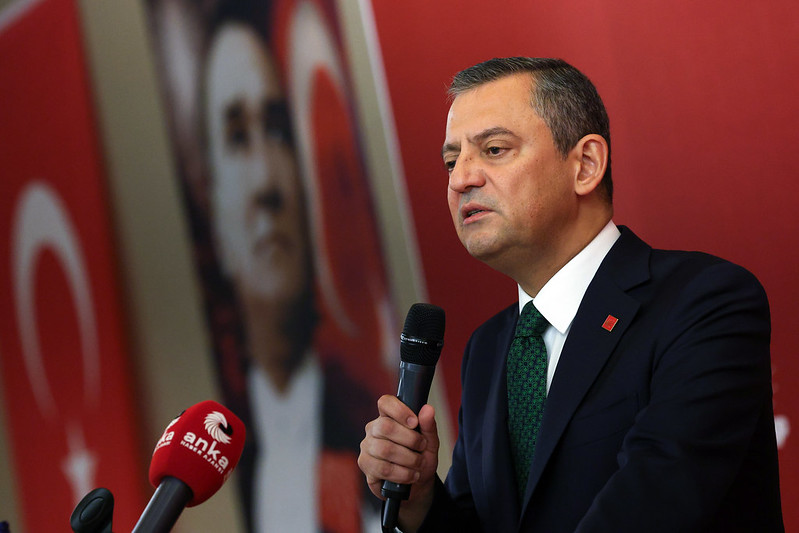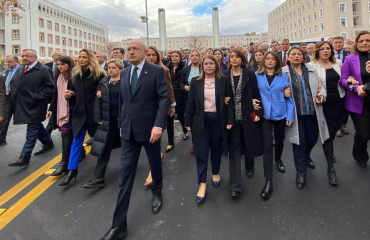

“CHP Chairperson Özgür Özel has suggested renewing the elections in November 2025 or spring 2026. He said, ‘If the Grand National Assembly of Turkey (TBMM) renews the elections with 360 members’ backing, president Erdoğan will have the right to run one last time.'” (Photo: CHP)
Özgür Özel, the Chairperson of the Republican People’s Party (CHP), proposed renewing the elections in November 2025 or the spring of 2026. He stated, “If the TBMM renews the elections with 360 members’ backing, president Erdoğan will have the right to run one last time.” Separately, he promised the impossible by saying, “We will return to a parliamentary system”.
President Erdoğan cannot run for a fourth time
In my article published before the May 2023 elections, I explained that according to paragraph (2) of Article 101 of the Constitution a person can be elected president no more than twice, and thus can only run for president twice. The only exception to this is if the TBMM decides to renew the elections in accordance with Article 116(3) of the Constitution. In the event the TBMM renews the elections the sitting president who is serving their second term can run for a third time.
Article 101(2) of the Constitution explicitly provides there is no debate as to whether a person who has served two terms as president can run for president.
The issue discussed before the May 2023 election, and thus still relevant today, is whether Recep Tayyip Erdoğan’s term before 2018 should be counted when applying article 101(2).
Several architects of the 2017 Constitutional amendment have argued that President Recep Tayyip Erdoğan could run for a third time in the May 2023 elections, on the basis that the transition to the presidential system was a milestone, a new beginning, and that because Article 101 had been entirely rewritten, Erdoğan’s presidency before 2018 should not be counted toward the term limit.
The deliberate misrepresentation
Mustafa Şentop, who was then Speaker of the TBMM and had previously served as chair of the Constitution Committee, possessing an intimate knowledge of the amendments due to his role in drafting them, Yavuz Atar, a professor of Constitutional law and Vice President of the Presidential Board of Education Policies, and Mehmet Uçum, Vice President of the Presidential Board of Legal Policies, have argued in unison that Erdoğan’s presidency before 2018 should not count.
These individuals claimed that Article 101 had been completely rewritten in the 2017 constitutional amendment beginning a new era with the transition to the presidential system, meaning Erdoğan’s pre-2018 term should not count towards the term limit for the May 2023 elections.
As a result of these “unconstitutional” claims from individuals holding powerful offices of the state, the explicit content of Article 101(2) was ignored. The Supreme Election Council (YSK), which at the time had not been fully constituted in accordance with the law and its founding principles, accepted Erdoğan’s third candidacy for the presidency, proving the adage “might is right” and giving credence to their tainted view.
Özel goes further than Kılıçdaroğlu
On this critical issue, the then-chairperson of the CHP, Kemal Kılıçdaroğlu, acknowledged that Erdoğan could not run for president according to the Constitution but said they would not fight it because the YSK would inevitably accept Erdoğan’s candidacy despite being unconstitutional. Kılıçdaroğlu also argued that even if the YSK rejected the candidacy Erdoğan would win by playing the victim. This should puzzle anyone because it is supposed to be impossible for one to win an election, he is not allowed to run in. Kılıçdaroğlu pre-emptively greenlit Erdoğan’s candidacy, claiming he would defeat him at the ballot box.
Özgür Özel has gone a step further than Kılıçdaroğlu by overlooking the YSK’s violation of Article 101(2) of the Constitution by accepting Erdoğan’s third candidacy in the May 2023 election. He is now pre-emptively allowing another violation of Article 101(2) of the Constitution by suggesting that Erdoğan could run for president a fourth time if the TBMM renews the elections.
The convenient inaction of oligarchic politics
It often seems there is a higher intelligence or hidden hand that determines how the state’s top organs, key institutions, and the ruling and opposition parties will be formed and behave. This is because the oligarchic political elite in both the government and the opposition can form unconstitutional agreements among themselves through passive inaction that disregards Constitutional provisions.
The fact that no one, not even the main opposition party CHP, has raised the issue of the 18(b) clause of the 2017 Constitutional amendment law number 6771, which clearly bars Erdogan’s 2023 candidacy reinforces the impression of this higher intelligence.
I hope that the politicians, along with the academics and legal experts who express opinions in exchange for the positions, ranks, and benefits they receive for them, will read and internalize the Constitution more carefully and express responsible opinions to save Turkey from sinking into the quagmire of elective autocracy where even the Constitution is ignored.
The deliberate errors of loyal bureaucrats
Article 18(b) of the 6771 Constitutional amendment law invalidates the distorted statements and justifications made by Şentop, Atar, and Uçum, which allowed Erdoğan to run for a third time in 2023.
The text of this law, accepted by the TBMM on 21 January 2017 and published in the Official Gazette on 11 February 2017, clearly states in article 18(b), “The amendments to articles 75, 77, 101, and 102 will come into force when the period of the first concurrent parliamentary and presidential elections begins.” As that has not happened yet, the provisions remain unchanged. It is clear then that the “new era” claimed by Şentop, Atar, and Uçum is a farce, and that the term limit has not been changed.
Can he run for office?
A simple question can conclude this matter: “Is the provision of Article 101(2), which states ‘A person can serve as president for no more than two terms,’ a provision that was amended?” The answer is unequivocally no!
The comparison table prepared by the Union of Turkish Bar Associations, which shows the changes made to the Constitution, clearly reveals that paragraph (2) of Article 101 was not changed in the 2017 Constitutional amendment; the previous text remained exactly the same, even down to the punctuation marks. Thus, the limitation that a person can only be elected president twice existed before 2017 and remained unchanged after 2018. Therefore, the conclusion is very simple: Erdoğan could not have run for a third and cannot run for a fourth time. There is no exception in the constitution, explicit or implicit, that excludes Erdoğan’s pre-2018 term, as claimed by Şentop, Atar, and Uçum, from counting toward the limit.
Şentop, Atar, and Uçum appear to have neglected their duties and acted contrary to ethical principles by ignoring the content of Article 18(b), which they should know better than anyone due to their active involvement in the drafting of the amended constitution. Their doing so reveals that they have promoted biased and flawed views.
The YSK violated the Constitution by ignoring this article and accepting the biased and erroneous views I have summarized, allowing Erdoğan to run for a third time in the May 2023 elections despite its prohibition by Article 101(2).
Isn’t the CHP bound to the Constitution?
By failing to highlight Article 18(b) and not fighting against this violation of the 101(2) provisions, Kılıçdaroğlu and the CHP, under his leadership, allowed Erdoğan’s third candidacy and presidency through inaction.
Now, under Özgür Özel’s leadership, the CHP is taking it a step further by legitimizing the 2023 violation and pre-emptively greenlighting the breaking of this rule again, choosing not to stand for the Constitution and citizens’ constitutional right.
Repeating Kılıçdaroğlu’s logical mistake, Özgür Özel is making the impossible promise that, “We will return to the parliamentary system” and creating a false expectation among voters.
To return to the parliamentary system, it would be necessary to amend the Constitution by changing the provisions altered in 2017 back to their original form. To achieve this, it would first be necessary to win the upcoming elections and secure either a two-thirds majority, that is, 400 deputies, in the TBMM, or to achieve a three-fifths majority, 360 deputies, to bring it to a referendum. Who believes that the CHP will win the elections with such a majority in the TBMM?
Would CHP relinquish the benefits of power?
Second, even if such a majority is achieved in the TBMM, the CHP, which having gained this majority would likely have its candidate elected president, would need to voluntarily relinquish the executive office’s limitless power and convince all its assembly members to accept this. The CHP does not have the internal party discipline to enforce such a decision; it would not be easy to persuade its deputies to step down from power after winning it through hardship and to hold another vote. Therefore, the idea that the CHP, after winning such power, would return to the parliamentary system seems overly optimistic.
Third, even if the first two conditions are met and the CHP wins power with a two-thirds majority and more than 360 deputies, the constitution will not automatically change just because the election is won. For this, the victorious CHP must first amend the constitution and then hold new elections under the parliamentary system, and it would need to win these new elections.
Returning to the parliamentary system is now a utopia
Thus, although the dream of returning to the parliamentary system may seem very attractive to the millions who support it and will vote for it, the rules of reason and logic show that the promise of “returning to the parliamentary system” is a utopia.
At this point, it becomes necessary to point out a crucial point that Turkey truly needs. If the CHP and Özel want early elections and are already giving the green light for Erdoğan to run, why don’t they consider turning this into an opportunity for the country’s benefit?
Considering the critical state of the rule of law, the efficiency and independence of the judiciary, it would be wise for politicians to reach a consensus and address these issues by forming a hybrid system. This system could combine the strengths of both the parliamentary and presidential systems, while eliminating their weaknesses. Such a hybrid system could be achieved through negotiations for a Constitutional amendment, forming a governance structure that benefits the nation.
Moreover, why not consider making Erdoğan’s candidacy conditional to a broader compromise that would include reforms in line with the rule of law, in a way that respects Constitutional norms? This would allow them to fulfil their duties in accordance with the Constitution and the law, while also serving the greater good of the country.
In conclusion, one might ask: Is the CHP and Özgür Özel truly acting in the interest of the nation, or do their actions suggest another motive entirely?
Translation by Charles Ediz Gün
A million-dollar question: Can Erdoğan run again for presidency?

